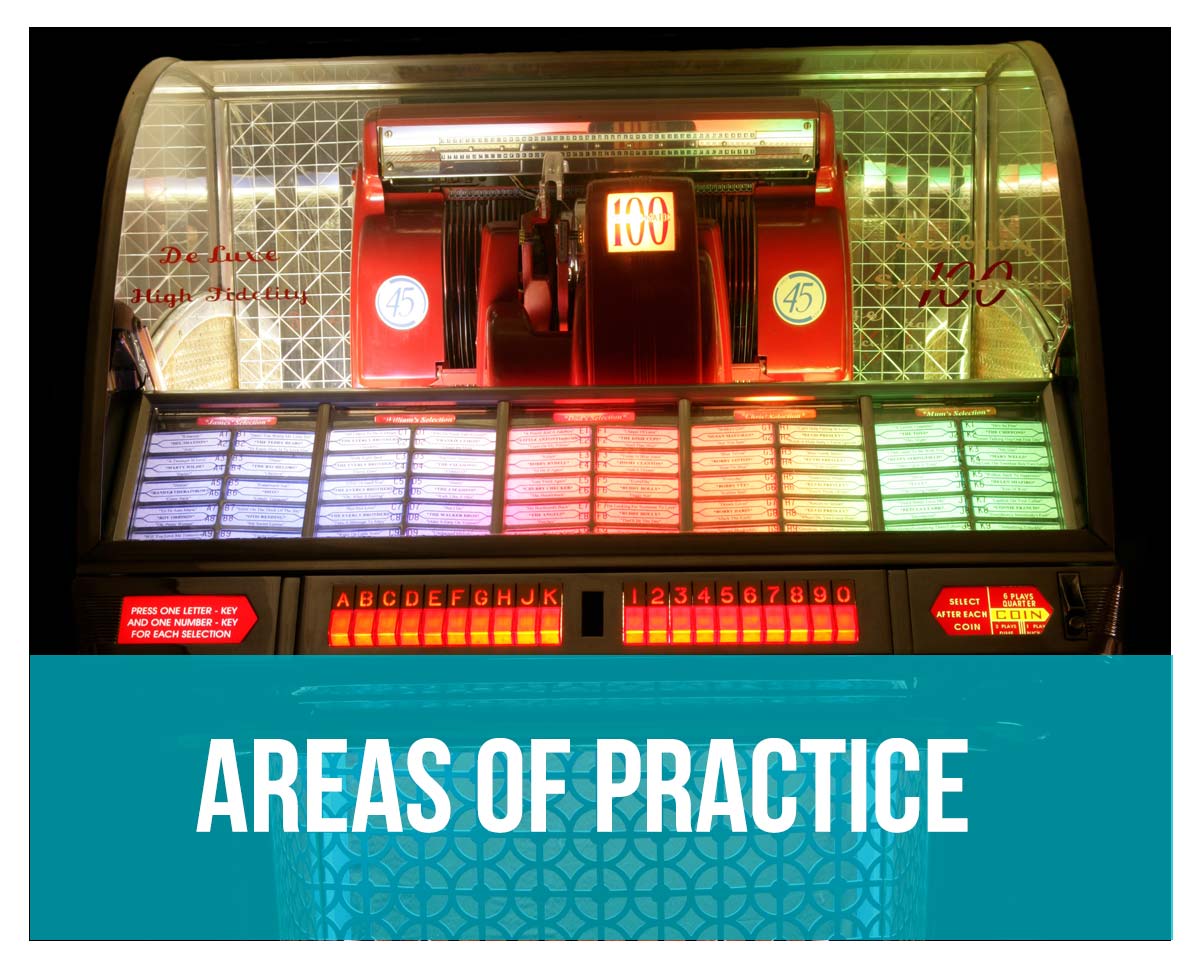Sonic Scoop
Avoiding Pitfalls of Music Law, with Entertainment Lawyer Ron Skoler
August 28th, 2014 by Blake Madden
At some point all musicians must ask themselves: Is this a job or a hobby? Even those able to make it to that mountaintop of gainful employment in music may find that they aren’t living out a fantasy so much as running a successful business, one with full-time responsibilities and economic concerns. Like not getting the pants sued off you.
“As a society and as a culture, we’re very litigious in general,” says entertainment lawyer Ron Skoler over the phone from his Manhattan law office. “In the music business, there has always been litigation, many times for good reason. A lot of the contracts have been one-sided. There’s also a lot of bad advice that goes around.”
Skoler is in the business of giving musicians good advice, and he’s been talking to them for most of his life. In high school he interviewed the likes of the Grateful Dead and John Lennon and Yoko Ono for national publications. In the mid-80s, Skoler’s Rhythm Method Enterprises managed and secured record contracts for seminal hip hop acts like Public Enemy, A Tribe Called Quest, Queen Latifah, and The Jungle Brothers. Currently, Skoler is helping to negotiate master sales of previously unreleased Jimi Hendrix material.
he interviewed the likes of the Grateful Dead and John Lennon and Yoko Ono for national publications. In the mid-80s, Skoler’s Rhythm Method Enterprises managed and secured record contracts for seminal hip hop acts like Public Enemy, A Tribe Called Quest, Queen Latifah, and The Jungle Brothers. Currently, Skoler is helping to negotiate master sales of previously unreleased Jimi Hendrix material.
I caught up with Skoler to talk about the changes he’s seen in the music industry over nearly three decades, and what musicians need to know if they’re going to survive their own success, let alone achieve it in the first place.
Go On, Take All of Me
“I hate to say this, but I’ve never seen a more difficult time for new artists,” Skoler says. He won’t speculate as to all the causes or try to order their importance, but the results are clear: In the past decade, the major record companies have lost tons of money, and with it, their propensity to take risks on up-and-coming artists.
“They don’t want to build stars or make stars, they want to sign stars. They want you to do everything yourself,” Skoler says. “The days when Bob Dylan, or Bruce Springsteen, or Public Enemy could walk into a record company with a tape, or audition live and have an A & R guy go ‘Wow, this is great, this knocks me out, I’m going to sign you’—those days are virtually gone.”
As record sales have decreased, the majors have not only narrowed their search efforts to exclude everyone but ‘sure thing’ artists, they want a bigger piece of that artist when they do sign them.
“Record contracts have now become what they call ‘360 deals’,” Skoler says. “In previous days, a record company would sign you to a record deal, meaning an exclusive agreement whereby you would record for them, they would manufacture recordings–vinyl, CD, cassette, whatever–and they would pay you a royalty on those records after recouping their original investment. The live shows were all yours. The music songwriting and publishing were all yours unless they signed you to a publishing deal as well.”
“About 7 or 8 years ago when record sales started to drop significantly, record companies started to develop 360 deals. What they said was: From now on, we’re not just signing you to make records; we are your partners in the music industry. Because of the investment in your career, we want to be a part of any income associated with it.”
Under a 360 deal, the record company can take a percentage of publishing, live show revenue, merchandise sales, endorsements, and product placement money–pretty much anything entertainment-related.
Skoler says musicians should be aware of these deals and how they work, although he says the deals aren’t bad in and of themselves. After all, Skoler helped developed these now industry-wide 360 contracts for his client, Roadrunner Records, years ago.
What’s In a Name? Who’s With the Band?
Pink Floyd. Black Sabbath. Creedence Clearwater Revival. Talking Heads. These names not only illuminate rock history, they are also the subjects of lawsuits brought by each respective band’s former frontman.
We know the tale by now: Frontman leaves band, band continues on instead of disintegrating, and former frontman claims new incarnation is a disingenuous attempt to cash in on the legacy he primarily created. The lawsuits often end out of court, after plenty of mud-slinging, and with no clear winner (John Fogerty won a temporary injunction against Creedence Clearwater Revisited; it was later overturned by a higher court that determined the lower court had misinterpreted portions of the Lanham Act). Perhaps that’s why Ron Skoler suggests bands iron out the details of who and what they are from day one.
“If they have a name that they love, file a trademark–what’s called a ‘service mark’. If they have a logo, we should file a trademark to protect that.”
Who these trademarks will officially belong to is part of the larger discussion bands should have regarding their partnership, songwriting royalties, and more.
“There should be a band agreement. It’s easier to get all this stuff on the table in the beginning, before they are successful, rather than later. Determine how money is going to be split and who will do what. Is it one person writing all the songs? Is the band all writing equally? Does one person write the lyrics while the other three write the music? What happens if one member leaves? What is his participation? Would a new member be brought in to replace them?”
“I just sat down with a band: Four members, they write songs together, but the vocalist writes all of the lyrics. I had to explain to them that the lyrics are half of the song so she should get 50% of the song, and the others who write the music would each get 1/3 of the other 50%. The music and lyrics each count as half of the song—that’s something that a lot of people don’t understand. They can agree to do that differently, but that’s the way it would be treated legally.”
 Skoler points to two of the biggest and most enduring rock bands ever, The Beatles and Rolling Stones, as examples of songwriting partnerships that kept things as simple as possible. John Lennon and Paul McCartney (for the Beatles), and Mick Jagger and Keith Richards (for the Stones) were listed as equal co-writers on every song, regardless of what portions of songs they worked on or to what extent.
Skoler points to two of the biggest and most enduring rock bands ever, The Beatles and Rolling Stones, as examples of songwriting partnerships that kept things as simple as possible. John Lennon and Paul McCartney (for the Beatles), and Mick Jagger and Keith Richards (for the Stones) were listed as equal co-writers on every song, regardless of what portions of songs they worked on or to what extent.
The sad flipside to that coin would be the case of the three Dead Kennedys members not named Jello Biafra versus their former frontman. In 1998, Ray Pepperell (“East Bay Ray”), Geoffrey Lyall (“Klaus Flouride”), and Darren Henley (“D.H. Peligro”) filed suit against Biafra and his sole proprietorship Alternative Tentacles Records (which put out the band’s albums), alleging unpaid royalties and fraud, among other charges. The band that built its reputation on an anti-corporate anti-authoritarian punk ethos participated in a public trial that revolved around poor record label promotion, songwriting credits, and the band’s ability to pursue commercial and movie licensing deals.
Ultimately, establishing trademarks and clear parameters of business within your band are as much to protect your business against imagined copyright thieves as they are to protect us from ourselves.
Having Your Cake and Letting Someone Else Eat It, Too
As recording contracts become more scarce and more demanding, musicians have begun to seek new avenues for profiting from their music, especially performance rights and licensing opportunities.
As Ron Skoler says, “It used to be that sync rights–getting a song in a commercial or something similar–was the icing on the cake. Now it’s the cake itself.”
According to the International Federation of the Phonographic Industry’s (IFPI) 2013 “Recording Industry in Numbers” report, global performance rights revenue rose 9.4% from 2011 to 2012 ($862 million to $943 million), making it the fastest-growing sector of the music industry. Synchronization revenue was also up 2% in that time period, while physical sales fell another 5%.
To put these numbers in more dollar-signs-in-your-eyes terms, while Spotify spins earn you fractions of pennies, according to The Guardian UK, a single placement of a song as background music in a television show could earn a few hundred pounds, a theme song could earn upwards of 40,000 pounds, a placement in a Hollywood movie could earn upwards of 100,000 pounds, and for a continuous ad campaign, “Between £300,000 and £400,000 would not be uncommon for the rights to the original recording for a defined campaign period, possibly doubling if its use is exclusive.”
“Form a publishing company,” says Ron Skoler. “It should be a corporation. Affiliate with ASCAP, BMI, SESAC, or all three if you form more than one company.” (A band might do this if its individual members have different affiliations.)
These performance rights organizations or “P.R.O.s” are responsible for securing royalties for you when you or anyone else plays your song anywhere at any time.
When companies like PlayNetwork or Mood Media place your song in a customized playlist for a trendy clothing store, you get a cut. When an emerging hip-hop artist wants to sample your song, or a budding chanteuse wants to cover it, you get a cut. (An even bigger one if you own the rights to your master recording). And when a band at a local bar covers your song—in theory at least—you get a cut. (If you’ve ever played a show and been given one of those handy printouts by the club that tells you where all the door money from your show has disappeared to, you should notice a line item for payments to one of these organizations).
“Just Take This Stuff Seriously”
“The fact that somebody can sue you doesn’t necessarily mean you’re liable,” Skoler says of accidents or injuries during live events. “It depends on the circumstances and it depends on the facts.”
In one case, Skoler defended a DJ at a hip-hop show from what he considered a frivolous liability lawsuit:
“There was a problem in the audience. Somebody got hurt and sued everybody in sight: the promoter, the venue, the other performers, my [client]. It was ridiculous because he wasn’t even on stage at the time. We had to get the case dismissed, but it took several months, and several thousand dollars.”
Skoler finds cases like that emblematic of the overly-litigious American populace, but he also warns of cases like that of Lamb of God’s Randy Blythe. Blythe spent five weeks in a prison in Prague, and later faced a trial for manslaughter in relation to the 2010 death of a teenage fan at a Lamb of God show in the Czech Republic.
Blythe was accused of pushing the fan off the stage, indirectly causing the head injury that later resulted in the fan’s death. Blythe was eventually acquitted of all charges, but he faced up to 10 years in prison if convicted. “If someone jumps onstage, and you push them off or commit a violent act, then you might be liable,” Skoler says.
“Promoters should have insurance. And it’s not a bad idea for a band to get insurance when they get a little more established. It’s not the glamorous part of the business, but if someone is serious about making this their life, this is something that should be done.”
With that comment, Skoler brings us full circle, back to the single most important conversation any musician should have with their bandmates or themselves, the one they need to have before they even start talking about 360 deals, trademarks, and liability insurance: How serious am I about this?
“Have an honest, open, frank conversation with the band—is this a career or is it a hobby? If this is going to be a business or career, you have to treat it like any other. If you want to be a lawyer or a doctor you have to go to school. If you want to open a Starbucks or a Chinese restaurant—whatever you want to do—you have to spend the time and money, you have to focus on it. Just take this stuff seriously.”
“Joseph Campbell said ‘follow your bliss’. If this is in your blood and this is really what you want to do with your life, I think that’s great. Just go into it with your eyes open and make sure you take the steps necessary to protect yourself, and good luck.”
If and when you run into any legal issues, just make sure a guy like Ron Skoler is on your side instead of the other side.






